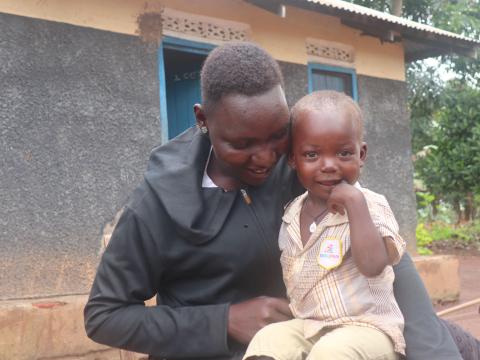Health Pooled Fund and World Vision strengthen mental health services and inclusion efforts in South Sudan

“Epilepsy robbed me of my future. It made me a single mother because no man is willing to live with an epileptic like me”, Jenty John, a 19-year-old mother of one, shares.
Jenty said her first epilepsy attack started when she was 14 at school in 2016. “I have no idea what happened and how it happened. I just woke up after an hour surrounded by my teachers and classmates all concerned of my condition”, she recalls.
She went home confused but kept it from her family. She adds, “But at exactly 8:00 pm when we were all ready for supper, the attack happened again. When I woke up, I found my mother and siblings crying not because I they thought I was dead, but because they assumed I will be a burden to the family.”

She tried going to school, but as the attacks became frequent every day, she dropped out. “The children often mocked and threw insults at me. The pressure became too much for me to bear, I stayed home”, she sadly shares.
Not only did Jenty feel helpless but also alone and neglected. She says, “My family isolated me from the community. The children were not allowed to eat and play with me. A man took advantage of my condition and got me pregnant before running away.”
Jenty’s mother Siama Samuel works as a prison warden, while her father Samuel is a retired civil servant. Siama says, “I lost hope in her when her epilepsy worsened. We never knew how to deal with her. But fate has opened better plans for us through World Vision.”
I can proudly say that I got my life back. I am excited because I can eat normally and share everything with my family again after years of isolation.
Jenty learned about the Mental Health (MH) Department supported by World Vision through the Health Pooled Fund (HPF) in Yambio State Hospital. The department was set-up after recommendations from the gender, equity, and social inclusion (GESI) initiative for the inclusion of people with disabilities and mental health issues.
Over a thousand people with several mental health issues have accessed the services in Nzara and Yambio Counties of South Sudan’s Western Equatoria State since it started its services on September 2020.
“I started receiving the epilepsy treatment in April 2021. By the following month, the frequency of the attacks was reduced from several times a day to twice a week. I never missed taking the medication”, Jenty shares proudly.

She believed the medication was effective in stopping her violent attacks. While she still experiences headaches, Jenty is happy with the improvement. She adds, “I can proudly say that I got my life back. I am excited because I can eat normally and share everything with my family again after years of isolation.”
“I do not intend to go back to school again but I am planning to venture into business to give my child the future that I missed because of epilepsy”, she says happily.
Siama says, “I never thought my daughter would get better and live a normal life again.” Jenty adds, “I appreciate World Vision’s initiative to open such a department to support vulnerable people like us.”
Stephen Epiu Leonard, HPF Project Manager says, “The mental health unit is managed by government health workers that receive incentives from the project. The unit will remain operational, even if HPF and World Vision leave the area someday, and is equipped to continue to support the people who had been neglected for a long time.”

Related Story: Empowering people with disabilities
Story and photos by Scovia Faida Charles Duku, Communications Coordinator